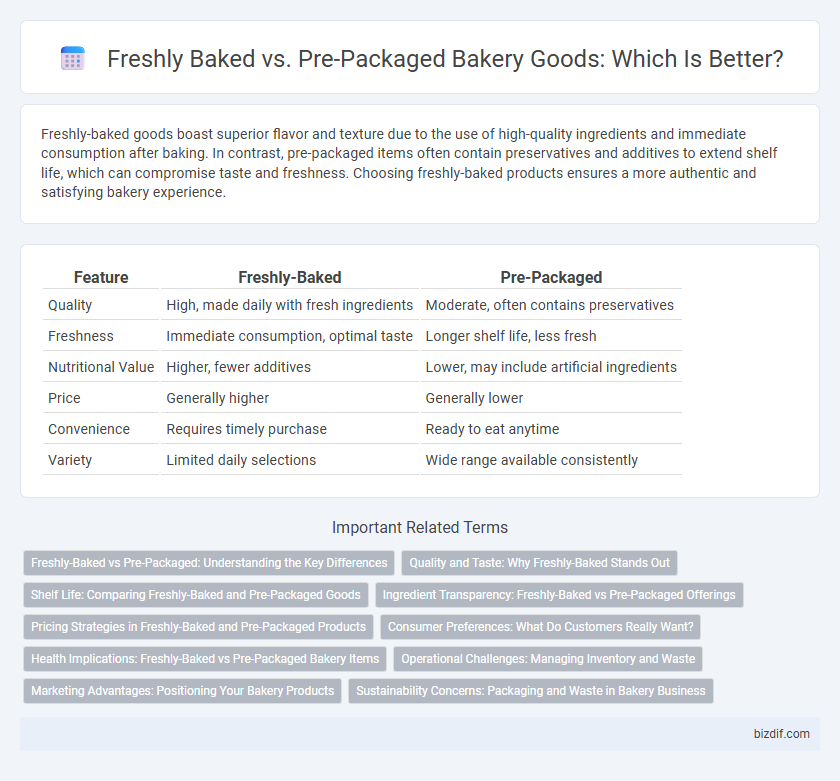Freshly-baked goods boast superior flavor and texture due to the use of high-quality ingredients and immediate consumption after baking. In contrast, pre-packaged items often contain preservatives and additives to extend shelf life, which can compromise taste and freshness. Choosing freshly-baked products ensures a more authentic and satisfying bakery experience.
Table of Comparison
| Feature | Freshly-Baked | Pre-Packaged |
|---|---|---|
| Quality | High, made daily with fresh ingredients | Moderate, often contains preservatives |
| Freshness | Immediate consumption, optimal taste | Longer shelf life, less fresh |
| Nutritional Value | Higher, fewer additives | Lower, may include artificial ingredients |
| Price | Generally higher | Generally lower |
| Convenience | Requires timely purchase | Ready to eat anytime |
| Variety | Limited daily selections | Wide range available consistently |
Freshly-Baked vs Pre-Packaged: Understanding the Key Differences
Freshly-baked goods offer superior flavor, texture, and aroma due to the use of high-quality ingredients and immediate consumption after baking, unlike pre-packaged items that often contain preservatives to extend shelf life. Freshly-baked products typically deliver better nutritional value, as they avoid artificial additives and maintain higher moisture levels, enhancing overall freshness. Understanding these differences helps consumers prioritize taste and health benefits when choosing between bakery-fresh and pre-packaged baked goods.
Quality and Taste: Why Freshly-Baked Stands Out
Freshly-baked bakery goods offer superior quality and taste due to their use of high-quality ingredients and absence of preservatives, ensuring a rich, authentic flavor profile. The texture of freshly-baked bread and pastries is notably fresher, with a crisp crust and soft interior that pre-packaged items often lack. Consumers consistently prefer freshly-baked products for their aromatic freshness and natural moisture, which pre-packaged goods typically fail to replicate.
Shelf Life: Comparing Freshly-Baked and Pre-Packaged Goods
Freshly-baked goods typically have a shorter shelf life, usually lasting 1 to 3 days due to the absence of preservatives and higher moisture content, which encourages mold growth. Pre-packaged bakery items often contain additives and are sealed in airtight packaging, extending their shelf life to several weeks or even months under proper storage conditions. Understanding these differences helps consumers optimize freshness, flavor, and food safety when choosing between freshly-baked and pre-packaged products.
Ingredient Transparency: Freshly-Baked vs Pre-Packaged Offerings
Freshly-baked bakery products prioritize ingredient transparency by using simple, natural components often sourced locally, allowing customers to trust the quality and freshness of each item. Pre-packaged baked goods frequently contain preservatives, artificial flavors, and longer ingredient lists that can obscure ingredient origins and nutritional content. Choosing freshly-baked options supports clearer labeling and a more authentic ingredient profile for health-conscious consumers.
Pricing Strategies in Freshly-Baked and Pre-Packaged Products
Freshly-baked products often employ premium pricing strategies reflecting their artisanal quality, freshness, and limited availability, appealing to consumers seeking superior taste and texture. Pre-packaged bakery items rely on competitive pricing and economies of scale to attract budget-conscious customers, emphasizing convenience and longer shelf life. Pricing decisions in both categories also consider production costs, ingredient quality, and consumer demand elasticity to maximize profitability.
Consumer Preferences: What Do Customers Really Want?
Consumers increasingly prefer freshly-baked products due to their superior taste, texture, and perceived quality compared to pre-packaged alternatives. Freshly-baked goods often evoke a sense of artisanal craftsmanship and freshness that appeals to health-conscious shoppers seeking natural ingredients and fewer preservatives. Despite convenience driving some demand for pre-packaged items, market trends indicate a strong consumer preference for bakery products with authentic flavors and freshness.
Health Implications: Freshly-Baked vs Pre-Packaged Bakery Items
Freshly-baked bakery items typically contain fewer preservatives and additives, leading to lower levels of artificial ingredients and improved nutritional quality compared to pre-packaged options. Pre-packaged bakery products often have higher amounts of sugars, unhealthy fats, and sodium to extend shelf life, which can negatively impact cardiovascular health and contribute to obesity. Choosing freshly-baked goods supports better digestion and overall wellness due to their natural ingredients and absence of chemical preservatives.
Operational Challenges: Managing Inventory and Waste
Freshly-baked bakery items require precise inventory management to balance daily production with fluctuating customer demand, minimizing waste caused by unsold perishable goods. Pre-packaged products offer longer shelf life and streamlined stock control but risk overstocking and reduced freshness perception, leading to potential customer dissatisfaction. Efficient operational systems integrating real-time sales data and waste tracking software help bakeries optimize inventory levels and reduce spoilage across both product types.
Marketing Advantages: Positioning Your Bakery Products
Freshly-baked goods offer unique marketing advantages by emphasizing artisanal quality, superior taste, and freshness that pre-packaged products often lack. Highlighting local ingredients and daily baking rituals enhances brand authenticity and customer trust, driving higher consumer engagement. Emphasizing the sensory experience and emotional connection positions bakery products as premium and desirable in a competitive market.
Sustainability Concerns: Packaging and Waste in Bakery Business
Freshly-baked bakery products generate less plastic waste compared to pre-packaged items, significantly reducing environmental impact through minimal packaging. Sustainable practices such as using biodegradable wrappers and reusable containers help bakeries decrease landfill contributions and carbon footprint. Emphasizing local sourcing and bulk sales further supports waste reduction and promotes eco-friendly consumption in the bakery industry.
Freshly-Baked vs Pre-Packaged Infographic

 bizdif.com
bizdif.com